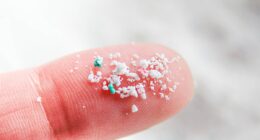Below, we’ll cover the basics of fortifying your gut while you’re on antibiotics. Plus: what you can do to promote gut restoration even further in the weeks and months thereafter.
How to protect your gut while you’re on antibiotics
Prioritize probiotics
Since antibiotics wipe out both good and bad gut bacteria, it’s common to experience digestive distress as you take them. “Studies show that taking a probiotic supplement can prevent upset stomach and diarrhea caused by antibiotic use,” says Bianca Tamburello, RDN, a dietitian on behalf of FRESH Communications. However, she and Greenfield both advise taking your antibiotic and probiotic at least a few hours apart so the latter has a better chance to survive.
Prioritizing foods with probiotics also get the green light. “While taking an antibiotic, eating probiotic-rich fermented foods like kraut, kimchi, and yogurt can help preserve gut health,” Tamburello says.
…And prebiotics
While you’re at it, Greenfield also suggests consuming prebiotics, which feed friendly bacteria. “If you take probiotics and prebiotics while you take antibiotics, you can prevent some of the damage being done by the antibiotic, which can help with gut recovery time,” Greenfield explains. Fortunately, there are plenty of healthy prebiotic foods to choose from—including but not limited to garlic, onions, and asparagus.
Be careful with high-fiber foods
It’s important to not only add things into your routine as you take antibiotics—but also consume a few others on moderation. For instance, while fiber is beneficial for your digestion and gut health at large, you’ll be better off saving fiber-rich foods for once you complete your Rx. “It’s recommended to avoid high-fiber foods while taking antibiotics because fiber may interfere with how quickly the antibiotic is absorbed,” Tamburello says. (This may be a bit confusing as many—though not all—fibrous foods are also prebiotic. Some high-fiber foods worth saving for your post-antibiotic regimen include beans and legumes.)
Make sure to chill out
Last but not least, lifestyle factors will also play a role in your recovery. “Decreasing stress and prioritizing rest while you are on antibiotics will help your gut be more resilient,” Greenfield adds.
Decreasing stress and prioritizing rest while you are on antibiotics will help your gut be more resilient,” Greenfield adds.
Tips to restore your gut after antibiotics
Once you finish your round of antibiotics, the standard tips and tricks for gut health apply. “After an antibiotic regimen is complete, eat foods high in probiotics, prebiotics, and fiber to restore the number and diversity of good gut bacteria and feed a healthy gut,” Tamburello says. “Probiotics increase the number of gut bacteria and promote gut balance,” while the last two “are especially beneficial when rebounding your gut health after a course of antibiotics.”
READ RELATED: ‘I’m a Private Chef Who Shops Erewhon Daily for My Celeb Clients—Here, 5 Clever ‘Workarounds’ To Save Big on Your Bill’
In fact, a 2019 study found that low-fiber diets exacerbated microbiota collapse and delayed recovery following antibiotic treatment, so be sure to rev up your fiber intake via veggies and pantry staples alike. “Most high-fiber foods have prebiotic benefits,” Tamburello reiterates, so they’ll typically offer two-for-one perks.
Further, Greenfield recommends eating a colorful diet rich in whole foods to promote the health of your microbiome. “Sunlight exposure helps balance circadian rhythm, which helps improve gut function,” she adds. “Since vitamin D can decrease gut permeability, adequate levels of vitamin D are important—ideally through sun exposure or supplementation.”
How long will it take to restore your gut after antibiotics?
Greenfield says that the answer to this question isn’t so simple to answer, as the research isn’t so clear-cut. Results will also vary based on which antibiotics you take, the specific bacteria strains measured, and similar considerations. That said, recent studies and reviews offer optimistic findings. Per a 2020 meta-analysis of 31 articles on gut microbiota and antibiotic use, “After cessation of treatment, gut bacteria recover, in most individuals, to their baseline state within a few weeks. Some studies suggested longer term effects from two to six months.”
“After cessation of treatment, gut bacteria recover, in most individuals, to their baseline state within a few weeks. Some studies suggested longer term effects from two to six months.”
In general, Greenfield says that the state of your gut and overall health before taking antibiotics will be highly influential in how quickly you’re able to restore your microbiome afterwards. “If you already had good gut diversity, the chances are the first round of antibiotics are not going to eradicate whole species of bacteria,” says Greenfield. “But if you already had weakened gut function, or have taken many rounds of antibiotics, the effects can be more damaging.”
Plus, additional factors that influence gut diversity—i.e., everything from your regular dietary and lifestyle habits, pre-existing conditions, medications, and stress levels—will inform your timeline for microbiome restoration.
To gain clarity and ensure that your gut health is trending in the right direction, Greenfield recommends getting a stool test done with a functional health expert. “I like to wait 14 days after taking antibiotics to test microbiome diversity. This gives us enough time to see what the bacteria look like after the antibiotic has been taken,” she says. From there, personalized protocols can lead the way and promote a greater abundance of the friendly bacteria your gut and greater health need to thrive.
Source




